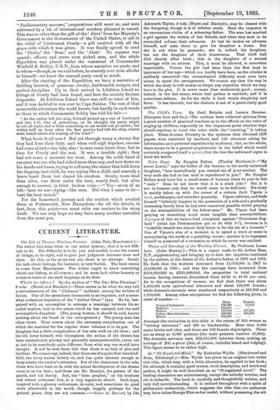What's his Offence? By the Author of "The Two Miss
Flemings." 3 vols. (Hurst and Blackett.)—There seems to be what we may call a recrudescence of the " Claimant " epidemic among the writers of fiction. One of the prominent characters is an impostor, and a some- what audacious impostor, of the "Arthur Orton" type. He ha.. bar- gained with an accomplice to arrange a marriage between his so- called nephew, heir to the estate which he has usurped, and the said accomplice's daughter. (The young woman, it should be said, knows nothing about the fraud or the arrangement.) The young man has other views. Thus comes about the necessary complication out of which the material for the regular three volumes is to be got. The daughter has a little complication of her own with an old lover ; and the old lover himself, who throughout the action of the drama has been mysteriously gloomy and generally incomprehensible, turns out at last to be somebody quite different from what any one would have thought. It will be seen from this that there is no lack of plot and incident. We cannot say, indeed, that these are of a quite first-rate kind. Still, the story moves briskly on, and has quite interest enough to keep awake the reader's attention. But of the characters in the tale, those who have least to do with the actual development of the drama seem to us the best ; and these are Mr. Hamlyn, the parson of the parish, and his family. Joel, the "false prophet," as his brothers and sisters nickname him, is a very ingenious sketch. Such boys, inspired with a gloomy enthusiasm, do exist, and sometimes do good work afterwards in the world, though, happily perhaps for the general peace, they are not common.—Snow in Harvest, by Ida Ashworth Taylor, 3 vols. (Hurst and Blackett), may be classed with the foregoing, though it is of inferior merit. Here the impostor is an unconscious victim of a scheming father. The man has married a girl against the wishes of her friends, and when they seek to be reconciled refuses their advances. At last he makes an advance himself, and asks them to give his daughter a home. But she is not what he pretends ; she is, indeed, his daughter, bat not the daughter of their kinswoman. That child had died shortly after birth ; this is the daughter of a second marriage with an actress. This, it mast be allowed, is somewhat improbable. Unless the girl had been from the first kept in ignorance of her age—which can hardly have been, as the scheme is suddenly conceived—the chronological difficulty mast soon have arisen to upset the arrangement. We cannot say that the way in which the story is told makes us forget any objection which we may have to the plot. It is never more than moderately good ; except, indeed, in the last scene, where real pathos is reached ; and it is sometimes tedious. As for the style, it both wants simplicity and force. It has rhetoric, but the rhetoric is not of a particularly good quality.


































 Previous page
Previous page